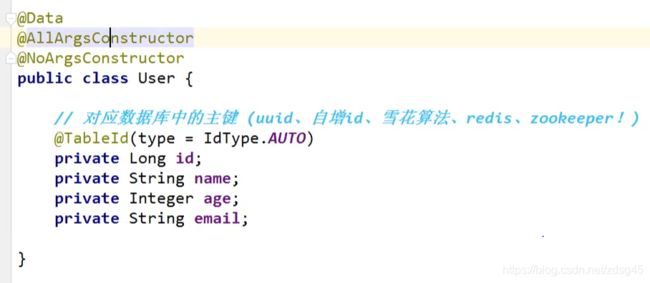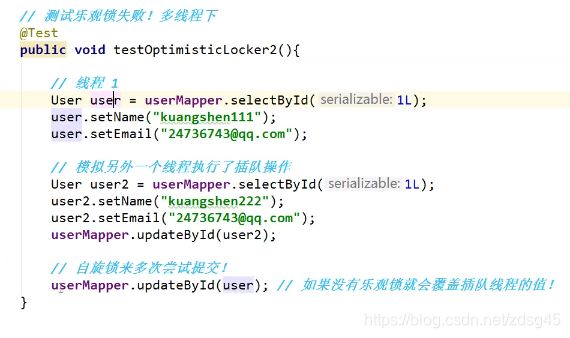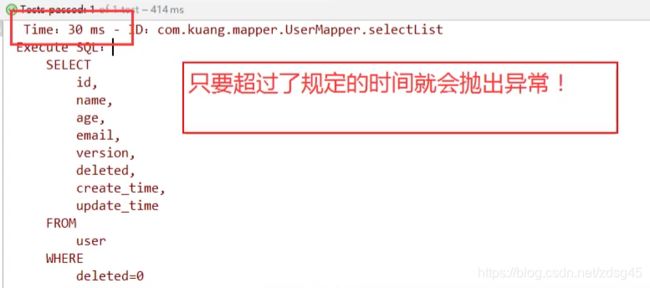mybatis-puls详细笔记(更新)
mybatis-plus
官方地址:https://mp.baomidou.com/
简介
MyBatis-Plus(简称 MP)是一个 MyBatis 的增强工具,在 MyBatis 的基础上只做增强不做改变,为简化开发、提高效率而生。
愿景
我们的愿景是成为 MyBatis 最好的搭档,就像 魂斗罗 中的 1P、2P,基友搭配,效率翻倍。
特性
- 无侵入:只做增强不做改变,引入它不会对现有工程产生影响,如丝般顺滑
- 损耗小:启动即会自动注入基本 CURD,性能基本无损耗,直接面向对象操作
- 强大的 CRUD 操作:内置通用 Mapper、通用 Service,仅仅通过少量配置即可实现单表大部分 CRUD 操作,更有强大的条件构造器,满足各类使用需求
- 支持 Lambda 形式调用:通过 Lambda 表达式,方便的编写各类查询条件,无需再担心字段写错
- 支持主键自动生成:支持多达 4 种主键策略(内含分布式唯一 ID 生成器 - Sequence),可自由配置,完美解决主键问题
- 支持 ActiveRecord 模式:支持 ActiveRecord 形式调用,实体类只需继承 Model 类即可进行强大的 CRUD 操作
- 支持自定义全局通用操作:支持全局通用方法注入( Write once, use anywhere )
- 内置代码生成器:采用代码或者 Maven 插件可快速生成 Mapper 、 Model 、 Service 、 Controller 层代码,支持模板引擎,更有超多自定义配置等您来使用
- 内置分页插件:基于 MyBatis 物理分页,开发者无需关心具体操作,配置好插件之后,写分页等同于普通 List 查询
- 分页插件支持多种数据库:支持 MySQL、MariaDB、Oracle、DB2、H2、HSQL、SQLite、Postgre、SQLServer 等多种数据库
- 内置性能分析插件:可输出 Sql 语句以及其执行时间,建议开发测试时启用该功能,能快速揪出慢查询
- 内置全局拦截插件:提供全表 delete 、 update 操作智能分析阻断,也可自定义拦截规则,预防误操作
支持数据库
- mysql 、 mariadb 、 oracle 、 db2 、 h2 、 hsql 、 sqlite 、 postgresql 、 sqlserver
- 达梦数据库 、 虚谷数据库 、 人大金仓数据库
快速指南
我们将通过一个简单的 Demo 来阐述 MyBatis-Plus 的强大功能,在此之前,我们假设您已经:
- 拥有 Java 开发环境以及相应 IDE
- 熟悉 Spring Boot
- 熟悉 Maven
使用第三方组件:
1、导入对应的依赖
2、研究依赖如何配置
3、代码如何编写
4、提高扩展技术的能力
步骤
1、创建数据库 mybatis_plus
现有一张 User 表,其表结构如下:
| id | name | age | |
|---|---|---|---|
| 1 | Jone | 18 | [email protected] |
| 2 | Jack | 20 | [email protected] |
| 3 | Tom | 28 | [email protected] |
| 4 | Sandy | 21 | [email protected] |
| 5 | Billie | 24 | [email protected] |
其对应的数据库 Schema 脚本如下:
DROP TABLE IF EXISTS user;
CREATE TABLE user
(
id BIGINT(20) NOT NULL COMMENT '主键ID',
name VARCHAR(30) NULL DEFAULT NULL COMMENT '姓名',
age INT(11) NULL DEFAULT NULL COMMENT '年龄',
email VARCHAR(50) NULL DEFAULT NULL COMMENT '邮箱',
PRIMARY KEY (id)
);
-- 真实开发中,version(乐观锁),deleted(逻辑删除)、gmt_create、gem_mo
其对应的数据库 Data 脚本如下:
DELETE FROM user;
INSERT INTO user (id, name, age, email) VALUES
(1, 'Jone', 18, '[email protected]'),
(2, 'Jack', 20, '[email protected]'),
(3, 'Tom', 28, '[email protected]'),
(4, 'Sandy', 21, '[email protected]'),
(5, 'Billie', 24, '[email protected]');
2、导入相应的依赖
<dependency>
<groupId>mysqlgroupId>
<artifactId>mysql-connector-javaartifactId>
<scope>runtimescope>
dependency>
<dependency>
<groupId>com.baomidougroupId>
<artifactId>mybatis-plus-boot-starterartifactId>
<version>3.3.1.tmpversion>
dependency>
<dependency>
<groupId>org.projectlombokgroupId>
<artifactId>lombokartifactId>
<version>1.18.10version>
<scope>providedscope>
dependency>
说明:我们使用mybatis-plus可以节省我们大量的代码,尽量不要同时导入mybatis和mybatis-plus! 版本的差异!
3、连接数据库
# mysql 5 驱动不同 com.mysql.jsbc.Driver
# mysql 8 驱动不同 com.mysql.cj.jsbc.Driver、需要增加时区的配置
spring.datasource.username=root
spring.datasource.password=123
spring.datasource.url=jdbc:mysql://localhost:3306/mybatis_plus?useSSL=false&useUnicode=true&characterEncoding=utf-8&serverTimezone=GMT%2B8
spring.datasource.driver-class-name=com.mysql.cj.jdbc.Driver
4、编写代码
pojo–>dao–>(连接mybatis,配置mapper.xml文件)–>service-controller (传统方式 )
使用mybatis-plus之后
* pojo
* dao接口(不用写mapper.xml文件)
* 使用
编写实体类 User.java(此处使用了 Lombok 简化代码)
@Data
public class User {
private Long id;
private String name;
private Integer age;
private String email;
}
编写Mapper类 UserMapper.java
//在对应的Mapper上继承基本的类baseMapper
public interface UserMapper extends BaseMapper<User> {
//所有的CRUD已经编写完成
//不需要像以前的配置一些xml
}
在 Spring Boot 启动类中添加
@MapperScan注解,扫描 Mapper 文件夹:
@SpringBootApplication
@MapperScan("com.baomidou.mybatisplus.mapper")//扫描mapper文件夹
public class Application {
public static void main(String[] args) {
SpringApplication.run(QuickStartApplication.class, args);
}
}
添加测试类,进行功能测试:
@RunWith(SpringRunner.class)
@SpringBootTest
public class SampleTest {
@Autowired
private UserMapper userMapper;
@Test
public void testSelect() {
System.out.println(("----- selectAll method test ------"));
//参数是一个Wrapper,条件结构器,这里先不用 填null
//查询所有的用户
List<User> userList = userMapper.selectList(null);
Assert.assertEquals(5, userList.size());
userList.forEach(System.out::println);
}
}
UserMapper 中的
selectList()方法的参数为 MP 内置的条件封装器Wrapper,所以不填写就是无任何条件
控制台输出:
User(id=1, name=Jone, age=18, [email protected])
User(id=2, name=Jack, age=20, [email protected])
User(id=3, name=Tom, age=28, [email protected])
User(id=4, name=Sandy, age=21, [email protected])
User(id=5, name=Billie, age=24, [email protected])
完整的代码示例请移步:Spring Boot 快速启动示例 [Spring MVC 快速启动示例]
5、小结
通过以上几个简单的步骤,我们就实现了 User 表的 CRUD 功能,甚至连 XML 文件都不用编写!
从以上步骤中,我们可以看到集成MyBatis-Plus非常的简单,只需要引入 starter 工程,并配置 mapper 扫描路径即可。
但 MyBatis-Plus 的强大远不止这些功能,想要详细了解 MyBatis-Plus 的强大功能?那就继续往下看吧!
配置日志
我们所用的sql现在是不可见的,我们希望知道他是怎么执行的,所以我们必须要查看日志!
#配置日志
mybatis-plus.configuration.log-impl=org.apache.ibatis.logging.stdout.StdouImpl
常用注解
@TableName("表名")
当表名与实体类名不一致时,可以在实体类上加入@TableName()声明
@TableId声明属性为表中的主键(若属性名称不为默认id)
@TableFieId("字段") 当实体类属性与表字段不一致时,可以用来声明
@TableName("表名")
public class User{
@TableId
private Long userId;
@TableFieId("name")
private String realName
}
CRUD扩展
Insert 插入
// 插入一条记录
int insert(T entity);
参数说明
| 类型 | 参数名 | 描述 |
|---|---|---|
| T | entity | 实体对象 |
举例测试
@Test
public void testInsert() {
System.out.println(("----- selectAll method test ------"));
User user = new User();
user.setName=("shuishui");
user.setAge(3);
user.setEmail("[email protected]");
userMapper.insert(user);
}
数据库插入的id为全局默认的id(ID_WORKER)
主键生成策略
分布式系统唯一id生成
雪花算法
SnowFlake 算法,是 Twitter 开源的分布式 id 生成算法。其核心思想就是:使用一个 64 bit 的 long 型的数字作为全局唯一 id。在分布式系统中的应用十分广泛,且ID 引入了时间戳,基本上保持自增的。
这 64 个 bit 中,其中 1 个 bit 是不用的,然后用其中的 41 bit 作为毫秒数,用 10 bit 作为工作机器 id,12 bit 作为序列号。
https://blog.csdn.net/lq18050010830/article/details/89845790
主键自增
我们需要配置主键自增
1、实体类字段上 @TableId(type =IdType.AUTO)
2、数据库字段一定要是自增的
其他的码源详解
public enum IdType {
AUTO(0), //数据可id自增
NONE(1), //未设置主键
INPUT(2), //手动输入
ID_WORKER(3), //默认的全局唯一id
UUID(4), //全局唯一id uuid
ID_WORKER_STR(5); // ID_WORKEK 字符串表示法
private int key;
private IdType(int key) {
this.key = key;
}
public int getKey() {
return this.key;
}
}
更新操作
// 根据 whereEntity 条件,更新记录
int update(@Param(Constants.ENTITY) T entity, @Param(Constants.WRAPPER) Wrapper<T> updateWrapper);
// 根据 ID 修改
int updateById(@Param(Constants.ENTITY) T entity);
#参数说明
| 类型 | 参数名 | 描述 |
|---|---|---|
| T | entity | 实体对象 (set 条件值,可为 null) |
| Wrapper | updateWrapper | 实体对象封装操作类(可以为 null,里面的 entity 用于生成 where 语句) |
举例测试
@Test
public void testUpdate() {
//sql自动动态配置
User user = new User();
user.setName=("shui");
user.setId(3L);
user.setAge("18");
//注意:updateById的参数是一个对象
userMapper.updateById(user);
}
自动填充
创建时间、修改时间!这些个操作一遍都是自动化完成,我们不希望手动更新!
阿里巴巴开发手册:所有的数据库表:gmt_create\gmt_modified几乎所有的表都要配置上!而且需要自动化
方式一:数据库级别
在表中新增字段 create_time 、update_time(默认CURRENT_TIMESIAMP)
方式二:代码级别
实体类上的属性需要增加注解==@TableField==
//创建时间
@TableField(fill = FieldFill.INSERT)
private Date createTime;
//更新时间
@TableField(fill = FieldFill.INSERT_UPDATE)
private Date updateTime;
编写处理器来处理这个注释即可!
@Slf4j
@Component
public class MyMetaObjectHandler implements MetaObjectHandler {
//插入时候的填充策略
@Override
@Componcent //一定不要忘记吧处理器加到IOC容器中
public void insertFill(MetaObject metaObject) {
log.info("start insert fill ...."); //日志
//设置字段的值(String fieldName字段名,Object fieldVal要传递的值,MetaObject metaObject)
this.setFieldVaLByName("createTime",new Date(),metaObject);
this.setFieldVaLByName("createTime",new Date(),metaObject);
//this.strictInsertFill(metaObject, "createTime", LocalDateTime.class, LocalDateTime.now()); // 起始版本 3.3.0(推荐使用)
// this.fillStrategy(metaObject, "createTime", LocalDateTime.now()); // 也可以使用(3.3.0 该方法有bug请升级到之后的版本如`3.3.1.8-SNAPSHOT`)
/* 上面选其一使用,下面的已过时(注意 strictInsertFill 有多个方法,详细查看源码) */
//this.setFieldValByName("operator", "Jerry", metaObject);
//this.setInsertFieldValByName("operator", "Jerry", metaObject);
}
//更新时间的填充策略
@Override
public void updateFill(MetaObject metaObject) {
log.info("start update fill ....");
this.setFieldVaLByName("createTime",new Date(),metaObject);
//this.strictUpdateFill(metaObject, "updateTime", LocalDateTime.class, LocalDateTime.now()); // 起始版本 3.3.0(推荐使用)
// this.fillStrategy(metaObject, "updateTime", LocalDateTime.now()); // 也可以使用(3.3.0 该方法有bug请升级到之后的版本如`3.3.1.8-SNAPSHOT`)
/* 上面选其一使用,下面的已过时(注意 strictUpdateFill 有多个方法,详细查看源码) */
//this.setFieldValByName("operator", "Tom", metaObject);
//this.setUpdateFieldValByName("operator", "Tom", metaObject);
}
}
吐槽:这么麻烦,难道用数据库不香吗?
乐观锁
面试中经常会问到乐观锁,悲观锁
乐观锁:顾名思义十分乐观,它总是被认为不会出现问题,无论干什么都不去上锁!如果出现了问题,再次更新测试
悲观锁:顾名思义十分悲观,它总是出现问题,无论干什么都会上锁!再去操作!
乐观锁实现方式
- 取出记录是,获取当前version
- 更新事,带上这个version
- 执行更新事,set version=newVersion where version =oldVersion
- 如果version不对,就更新失败
乐观锁: 1、先查询,获得版本号 version=1
--A
update user set name ="shuishui" ,version =version+1
where id =2 and version=1
--B 如果线程抢先完成,这个时候version=2,会导致A修改失败
update user set name ="shuishui" ,version =version+1
where id =2 and version=1
测试乐观锁
1、表中创建乐观锁字段version 默认值为1
@Version //乐观锁Version注解
private Integer version;
3、注册组件 (config包下)
springboot:
@EnableTransactionManagement
@MapperScan("com.baomidou.cloud.service.*.mapper*")
@Configuration//配置类
public class MyBatisPlusConfig{
//注册乐观锁插件
@Bean
public OptimisticLockerInterceptor optimisticLockerInterceptor() {
return new OptimisticLockerInterceptor();
}
}
spring xml:
<bean class="com.baomidou.mybatisplus.extension.plugins.OptimisticLockerInterceptor"/>
特别说明:
- 支持的数据类型只有:int,Integer,long,Long,Date,Timestamp,LocalDateTime
- 整数类型下
newVersion = oldVersion + 1 newVersion会回写到entity中- 仅支持
updateById(id)与update(entity, wrapper)方法 - 在
update(entity, wrapper)方法下,wrapper不能复用!!!
查询操作
// 根据 ID 查询
T selectById(Serializable id);
// 根据 entity 条件,查询一条记录
T selectOne(@Param(Constants.WRAPPER) Wrapper<T> queryWrapper);
// 查询(根据ID 批量查询)
List<T> selectBatchIds(@Param(Constants.COLLECTION) Collection<? extends Serializable> idList);
// 根据 entity 条件,查询全部记录
List<T> selectList(@Param(Constants.WRAPPER) Wrapper<T> queryWrapper);
// 查询(根据 columnMap 条件)
List<T> selectByMap(@Param(Constants.COLUMN_MAP) Map<String, Object> columnMap);
// 根据 Wrapper 条件,查询全部记录
List<Map<String, Object>> selectMaps(@Param(Constants.WRAPPER) Wrapper<T> queryWrapper);
// 根据 Wrapper 条件,查询全部记录。注意: 只返回第一个字段的值
List<Object> selectObjs(@Param(Constants.WRAPPER) Wrapper<T> queryWrapper);
// 根据 entity 条件,查询全部记录(并翻页)
IPage<T> selectPage(IPage<T> page, @Param(Constants.WRAPPER) Wrapper<T> queryWrapper);
// 根据 Wrapper 条件,查询全部记录(并翻页)
IPage<Map<String, Object>> selectMapsPage(IPage<T> page, @Param(Constants.WRAPPER) Wrapper<T> queryWrapper);
// 根据 Wrapper 条件,查询总记录数
Integer selectCount(@Param(Constants.WRAPPER) Wrapper<T> queryWrapper);
#参数说明
| 类型 | 参数名 | 描述 |
|---|---|---|
| Serializable | id | 主键ID |
| Wrapper | queryWrapper | 实体对象封装操作类(可以为 null) |
| Collection | idList | 主键ID列表(不能为 null 以及 empty) |
| Map |
columnMap | 表字段 map 对象 |
| IPage | page | 分页查询条件(可以为 RowBounds.DEFAULT) |
实例测试
@Test
public void testSelectById(){
User user =userMapper.selectById(1);
System.out.println(user)
}
//测试批量查询
@Test
public void testSelectByBatchId(){
List<User> user =userMapper.selectBatchIds(Arrays.asList(1,2,3));
users.forEach(System.out::println)
}
//条件查询
public void testSelectByBatchIds(){
HashMap<String,Object> map=new HashMap<>();
//自定义查询
map.put("name","shuishui");
map.put("age",3);
List<User> user = userMapper.selectByMap(map);
users.forEach(System.out::println);
}
自定义sql
方式一:
在Mapper文件中定义一个方法
@Select("select * from user ${ew.customSqlSegment}")
List<User> selectAll(@Param(Constants.WRAPPER)Wrapper<User> wrapper);
方式二:将sql写入xml中
在application中加入扫描mapper文件路径
mybatis-plus:
mapper-locations: com/mp/mapper/*
在*Mapper.xml中写sql
<mapper namespace="com.mp.dao.UserMapper">
<select id="selectAll" resultType="com.mp.entity.User">
select * from user ${ew.customSqlSegment}
select>
mapper>
测试
分页查询
分页在网站使用的十分多
1、原始的limit进行分页
2、pageHelper 第三方插件
3、Mybatis-Plus中也内置了分页插件!
如何使用
1、配置拦截器组件即可
//Spring boot方式
@EnableTransactionManagement
@Configuration
@MapperScan("com.baomidou.cloud.service.*.mapper*")
public class MybatisPlusConfig {
@Bean
public PaginationInterceptor paginationInterceptor() {
PaginationInterceptor paginationInterceptor = new PaginationInterceptor();
// 设置请求的页面大于最大页后操作, true调回到首页,false 继续请求 默认false
// paginationInterceptor.setOverflow(false);
// 设置最大单页限制数量,默认 500 条,-1 不受限制
// paginationInterceptor.setLimit(500);
// 开启 count 的 join 优化,只针对部分 left join
paginationInterceptor.setCountSqlParser(new JsqlParserCountOptimize(true));
return paginationInterceptor;
}
}
2、写测试
//测试分页查询
@Test
pulic void testPage(){
// 参数一:当前页
// 参数二:页面大小
// 使用了分页插件之后,所有的分页操作也变得简单了
Page<User> page =new Page<>(2,5);
userMapper.selectPage(page,null);
page.getRecords().forEach(System.out::println);
//获取总数
page.getTotal();
}
删除
// 根据 entity 条件,删除记录
int delete(@Param(Constants.WRAPPER) Wrapper<T> wrapper);
// 删除(根据ID 批量删除)
int deleteBatchIds(@Param(Constants.COLLECTION) Collection<? extends Serializable> idList);
// 根据 ID 删除
int deleteById(Serializable id);
// 根据 columnMap 条件,删除记录
int deleteByMap(@Param(Constants.COLUMN_MAP) Map<String, Object> columnMap);
#参数说明
| 类型 | 参数名 | 描述 |
|---|---|---|
| Wrapper | wrapper | 实体对象封装操作类(可以为 null) |
| Collection | idList | 主键ID列表(不能为 null 以及 empty) |
| Serializable | id | 主键ID |
| Map |
columnMap | 表字段 map 对象 |
测试删除:
@Test
public void testDeleteById(){
userMapper.deleteById(1);
}
//批量删除
@Test
public void testDeleteBatchId(){
userMapper.deleteBatchIds(Arrays.asList(1,2));
}
//条件删除
@Test
public void testDeleteMap(){
HashMap<String,Object> map = new HashMap<>();
map.put("name","shuishui");
userMapper.deleteByMap(Map);
}
在工作中会遇到逻辑删除
逻辑删除
物理删除 :从数据库中直接移出
逻辑删除:在数据库中没有被移出,而是通过一个变量来让他失效!deleted=0 ==>deleted =1(失效)
SpringBoot 配置方式:
-
application.yml 加入配置(如果你的默认值和mp默认的一样,该配置可无):
mybatis-plus: global-config: db-config: logic-delete-field: flag #全局逻辑删除字段值 3.3.0开始支持,详情看下面。 logic-delete-value: 1 # 逻辑已删除值(默认为 1) logic-not-delete-value: 0 # 逻辑未删除值(默认为 0) -
注册 Bean(3.1.1开始不再需要这一步):
import com.baomidou.mybatisplus.core.injector.ISqlInjector; import com.baomidou.mybatisplus.extension.injector.LogicSqlInjector; import org.springframework.context.annotation.Bean; import org.springframework.context.annotation.Configuration; @Configuration public class MyBatisPlusConfiguration { @Bean public ISqlInjector sqlInjector() { return new LogicSqlInjector(); } } -
实体类字段上加上
@TableLogic注解@TableLogic private Integer deleted; -
效果: 使用mp自带方法删除和查找都会附带逻辑删除功能 (自己写的xml不会)
example 删除时 update user set deleted=1 where id =1 and deleted=0 查找时 select * from user where deleted=0 -
全局逻辑删除: 3.3.0开始支持
如果公司代码比较规范,比如统一了全局都是flag为逻辑删除字段。
使用此配置则不需要在实体类上添加 @TableLogic。
但如果实体类上有 @TableLogic 则以实体上的为准,忽略全局。 即先查找注解再查找全局,都没有则此表没有逻辑删除。
mybatis-plus: global-config: db-config: logic-delete-field: flag #全局逻辑删除字段值
附件说明
- 逻辑删除是为了方便数据恢复和保护数据本身价值等等的一种方案,但实际就是删除。
- 如果你需要再查出来就不应使用逻辑删除,而是以一个状态去表示。
如: 员工离职,账号被锁定等都应该是一个状态字段,此种场景不应使用逻辑删除。
- 若确需查找删除数据,如老板需要查看历史所有数据的统计汇总信息,请单独手写sql。
以上的CRUD操作都必须要掌握
通用service
配置:
1、创建一个service接口:
public interface UserService extends IService<User>{
}
2、创建实现类
public class UserServiceImpl extend ServiceImol<UserMapper,User> implements UserService{
}
3、测试方法
@RunWith(SpringRunner.class)
@SpringBootTest
public class ServiceTest{
@Autowired
private UserService userService;
//取一个值
@Test
public void getOne(){
User one = userService.getOne(Wrapper.<User>lambdaQuery().gt(User::getAge,25),false);
}
//批量插入
@Test
public void batch(){
User user1= new User();
user1.steName("shui");
user1.setAge("28");
User user2= new User();
user1.steName("shui2");
user1.setAge("29");
List<User> userList =Arrays.asList(user1,user2);
userService.saveBatch(userList);
}
@Test
public void chain(){
//查询
userService.lambdaQuery().ge(User::getAge,25).like(User::getName,"雨").list();
}
}
性能更新插件
我们在平时的开发中,会遇到一些慢sql。测试!druid…
作用:性能分析拦截器,用于输出每条SQL语句及执行时间
MP也提供性能分析插件,如果超过这和时间就会停止运行
1、导入插件
//Spring boot方式
@EnableTransactionManagement
@Configuration
@MapperScan("com.baomidou.cloud.service.*.mapper*")
public class MybatisPlusConfig {
/**
* SQL执行效率插件
*/
@Bean
@Profile({"dev","test"})// 设置 dev test 环境开启
public PerformanceInterceptor performanceInterceptor() {
PerformanceInterceptor performanceInterceptor = new PerformanceInterceptor();
performanceInterceptor.setMaxTime(100);// ms 设置sql执行的最大时间,如果超过就停止
performanceInterceptor.setFormat(true);
return new PerformanceInterceptor();
}
}
记得在SpringBoot配置环境为dev或者test环境!
2、测试使用
@Test
void contextLoads(){
//参数是一个Wrapper,条件结构器,这里先不用,填null
//查询全部用户
List<User> users =userMapper.selectList(null);
user.forEach(System.out::println);
}
注意!参数说明:
- 参数:maxTime SQL 执行最大时长,超过自动停止运行,有助于发现问题。
- 参数:format SQL SQL是否格式化,默认false。
- 该插件只用于开发环境,不建议生产环境使用。
条件构造器(Wrapper)
十分重要:Wrapper
我们写一些复杂的sql可以用它来完成
现做几个实例看看:
@Test
void contextLoads(){
// 查询name不为null的用户,并且邮箱不为null的永不,年龄大于等于20的用户
QueryWrapper<User> wrapper =new QueryWrapper<>();
wrapper.isNotNull("name");
wrapper.isNotNull("email");
wrapper.ge("age",12);
userMapper.selectList(wrapper).forEach(System.out::println);
}
@Test
void test2(){
// 查询name为shuishui的用户
QueryWrapper<User> wrapper =new QueryWrapper<>();
wrapper.eq("name","shuishui");
User user=userMapper.selectList(wrapper)
System.out.println(user);
}
@Test
void test3(){
// 查询年龄在20~30岁之间的用户
QueryWrapper<User> wrapper =new QueryWrapper<>();
wrapper.between("age",20,30);
Integer count =userMapper.selectCount(wrapper);//查询结果数
System.out.println(count);
}
//模糊查询
@Test
void test4(){
QueryWrapper<User> wrapper =new QueryWrapper<>();
wrapper.notLike("name",“s”);//相当于NOT LIKE '%s%'
wrapper.likeRight("email",“s”);//相当于LIKE 's%'
List<Map<String,Object>>maps =userMapper.selectMaps(wrapper);//查询结果数
maps.forEach(System.out::println);
}
@Test
void test5(){
QueryWrapper<User> wrapper =new QueryWrapper<>();
//子查询
wrapper.insql("id","select id from user where id<3");
List<Object> objects =userMapper.selectobjs(wrapper);
objects.forEach(System.out::println);
}
@Test
void test6(){
QueryWrapper<User> wrapper =new QueryWrapper<>();
//通过id进行排序
wrapper.orderByAsc("id");
List<User> users =userMapper.selectList(wrapper);
objects.forEach(System.out::println);
}
//姓王年龄大于等于25,按年龄降序,年龄相同按id升序排列
void test7(){
QueryWrapper<User> wrapper =new QueryWrapper<>();
wrapper.likeRoght("name","王").or().ge("age",25).ordeiByDesc("age").orderByAsc("id");
List<User> users =userMapper.selectList(wrapper);
objects.forEach(System.out::println);
}
//创建日期为2019年2月14日并且直属上级为姓王
void test8(){
QueryWrapper<User> wrapper =new QueryWrapper<>();
wrapper.apply("date_fromat(create_time,'%Y-%m-%d')='2019-02-14'").inSql("manager_id","select id from user where name like '王%'");
List<User> users =userMapper.selectList(wrapper);
objects.forEach(System.out::println);
}
//姓王并且(年龄小于40或者邮箱不为空)
void test9(){
QueryWrapper<User> wrapper =new QueryWrapper<>();
//lt小于,gt大于
wrapper.likeRoght("name","王").and(wq->wa.lt("age",40).or().isNotNull("email"))
List<User> users =userMapper.selectList(wrapper);
objects.forEach(System.out::println);
}
//不列出所有字段
@Test
void test10(){
QueryWrapper<User> wrapper =new QueryWrapper<>();
wrapper.select("id","name").like("name","雨").lt("age",40);
//不显示时间和id
//wrapper.select(User.class,info->!info.getColumn().equals("create_time")&&!info.getColumn().equals("manager_id")).like("name","雨").lt("age",40);
List<User> users =userMapper.selectList(wrapper);
objects.forEach(System.out::println);
}
更多的方法都在官方文档里
condition的用法
alleq的用法
allEq(Map<R, V> params)
allEq(Map<R, V> params, boolean null2IsNull)
allEq(boolean condition, Map<R, V> params, boolean null2IsNull)
- 全部eq(或个别isNull)
个别参数说明:
params : key为数据库字段名,value为字段值
null2IsNull : 为true则在map的value为null时调用 isNull 方法,为false时则忽略value为null的
- 例1:
allEq({id:1,name:"老王",age:null})—>id = 1 and name = '老王' and age is null - 例2:
allEq({id:1,name:"老王",age:null}, false)—>id = 1 and name = '老王'
allEq(BiPredicate<R, V> filter, Map<R, V> params)
allEq(BiPredicate<R, V> filter, Map<R, V> params, boolean null2IsNull)
allEq(boolean condition, BiPredicate<R, V> filter, Map<R, V> params, boolean null2IsNull)
个别参数说明:
filter : 过滤函数,是否允许字段传入比对条件中
params 与 null2IsNull : 同上
- 例1:
allEq((k,v) -> k.indexOf("a") >= 0, {id:1,name:"老王",age:null})—>name = '老王' and age is null - 例2:
allEq((k,v) -> k.indexOf("a") >= 0, {id:1,name:"老王",age:null}, false)—>name = '老王'
实例测试
@Test
void selecrAlleq(){
QueryWrapper<User> wrapper =new QueryWrapper<>();
Map<String,Object> params=new HashMap<String,Object>();
params.put("name","水");
params.put("age",25);
wrapper.allEq(params);
List<User> users =userMapper.selectList(wrapper);
users.forEach(System.out::println);
}
Lambda 条件构造器
作用:防误写!
@Test
public void selectLambda(){
// LambdaQueryWrapper lambda =new QueryWrapper().lambda();
// LambdaQueryWrapper lambda =new LambdaQueryWrapper();
LambdaQueryWrapper<User> lambda =new Wrapper.<User>lambdaQuery();
lambda.like(User::getName,"雨").lt(User::getAge,40); //写错会直接爆红
List<user> userList =userMapper.selectList(lambdaQuery);
userList.forEach(System.out::println);
}
AR模式
通过实体类对象直接实现CRUD
实体类操作:
@Data
@EqualsAndHashCode(callSuper = false)
public class User extends Model<User> {
private static final long serialVersionUID = 1L;
@ApiModelProperty(value = "用户id")
private String userId;
}
dao层Mapper接口操作:
public interface UserMapper extends BaseMapper<RentDetail> {
}
实例测试:
// 测试插入
@Test
public void insert(){
User user =new User();
user.setName("水");
user.setAge(29);
...
user.insert(); //不用再调用mapper接口,直接实现
}
// 测试查询
@Test
public void select(){
User user =new User();
user.selectById(1);
}
@Test
public void select2(){
User user =new User();
user.setId(1);
user.selectById();
}
//测试更新
@Test
public void update(){
User user =new User();
user.setId(1);
user.setName("火")
user.updateById();
}
//测试删除
@Test
public void delete(){
User user =new User();
user.setId(1);
user.deleteById();
}
代码自动生成器
dao、pojo、conrtroller、service自动生成
package com.kuang;
import com.baomidou.mybatisplus.annotation.DbType;
import com.baomidou.mybatisplus.annotation.FieldFill;
import com.baomidou.mybatisplus.annotation.IdType;
import com.baomidou.mybatisplus.annotation.TableField;
import com.baomidou.mybatisplus.generator.AutoGenerator;
import com.baomidou.mybatisplus.generator.config.DataSourceConfig;
import com.baomidou.mybatisplus.generator.config.GlobalConfig;
import com.baomidou.mybatisplus.generator.config.PackageConfig;
import com.baomidou.mybatisplus.generator.config.StrategyConfig;
import com.baomidou.mybatisplus.generator.config.po.TableFill;
import com.baomidou.mybatisplus.generator.config.rules.DateType;
import com.baomidou.mybatisplus.generator.config.rules.NamingStrategy;
import java.util.ArrayList;
// 代码自动生成器
public class KuangCode {
public static void main(String[] args) {
// 需要构建一个 代码自动生成器 对象
AutoGenerator mpg = new AutoGenerator();
// 配置策略
// 1、全局配置
GlobalConfig gc = new GlobalConfig();
String projectPath = System.getProperty("user.dir");
gc.setOutputDir(projectPath+"/src/main/java");
gc.setAuthor("狂神说");
gc.setOpen(false);
gc.setFileOverride(false);// 是否覆盖
gc.setServiceName("%sService");// 去Service的I前缀
gc.setIdType(IdType.ID_WORKER);
gc.setDateType(DateType.ONLY_DATE);
gc.setSwagger2(true);
mpg.setGlobalConfig(gc);
//2、设置数据源
DataSourceConfig dsc = new DataSourceConfig();
dsc.setUrl("jdbc:mysql://localhost:3306/kuang_community? useSSL=false&useUnicode=true&characterEncoding=utf-8&serverTimezone=GMT%2B8");
dsc.setDriverName("com.mysql.cj.jdbc.Driver");
dsc.setUsername("root");
dsc.setPassword("123456");
dsc.setDbType(DbType.MYSQL);
mpg.setDataSource(dsc);
//3、包的配置
PackageConfig pc = new PackageConfig();
pc.setModuleName("blog");
pc.setParent("com.kuang");
pc.setEntity("entity");
pc.setMapper("mapper");
pc.setService("service");
pc.setController("controller");
mpg.setPackageInfo(pc);
//4、策略配置
StrategyConfig strategy = new StrategyConfig();
strategy.setInclude("blog_tags","course","links","sys_settings","user_record"," user_say"); // 设置要映射的表名
strategy.setNaming(NamingStrategy.underline_to_camel);
strategy.setColumnNaming(NamingStrategy.underline_to_camel);
strategy.setEntityLombokModel(true);// 自动lombok;
strategy.setLogicDeleteFieldName("deleted"); // 自动填充配置
TableFill gmtCreate = new TableFill("gmt_create", FieldFill.INSERT);
TableFill gmtModified = new TableFill("gmt_modified", FieldFill.INSERT_UPDATE);
ArrayList<TableFill> tableFills = new ArrayList<>();
tableFills.add(gmtCreate);
tableFills.add(gmtModified);
strategy.setTableFillList(tableFills);
// 乐观锁
strategy.setVersionFieldName("version");
strategy.setRestControllerStyle(true);
strategy.setControllerMappingHyphenStyle(true);
// localhost:8080/hello_id_2
mpg.setStrategy(strategy);
mpg.execute();
//执行
}
}






